|
|
|
Sort Order |
|
|
|
Items / Page
|
|
|
|
|
|
|
| Srl | Item |
| 1 |
ID:
124212
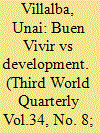

|
|
|
|
|
| Publication |
2013.
|
| Summary/Abstract |
The concept of development and the ways of achieving it have been widely criticised from various viewpoints. In the face of the apparent obsolescence of long-standing models, the novel Buen Vivir approach (roughly translated as 'living well' or 'good living'), which has arisen in different parts of Latin America, may offer an alternative paradigm. However, the implementation of policies that could lead to this Buen Vivir model requires profound changes that follow a range of complex transitions, which may often even seem contradictory in countries like Ecuador, where this approach has already been enacted in the new constitution and laws but where old development practices still continue. Accepting the plurality of visions on Buen Vivir (from the indigenous ontology to the 'Western-modern' approach), while at the same time positing common ground in which to define a new development strategy able to overcome a natural resource extraction-based economic pattern, is one of the immediate challenges.
|
|
|
|
|
|
|
|
|
|
|
|
|
|
|
|
| 2 |
ID:
171378


|
|
|
|
|
| Summary/Abstract |
Energy subsidies cost Ecuador 7% of its public budget, or two thirds of the fiscal deficit. Removing these subsidies would yield local economic and environmental benefits and help implement climate targets set in the Paris Agreement. However, adverse effects on vulnerable households can make subsidy reforms politically difficult. To inform policy design, we assess the distributional impacts of energy subsidy reform using Ecuadorian household data and an augmented input-output table. We find that subsidy removal without compensation would be regressive for diesel and LPG, progressive for gasoline, and approximately neutral for electricity. We then analyze how freed up public revenues could fund in-kind and in-cash compensation schemes to mitigate income losses for poor households. Our results indicate that removing all energy subsidies and increasing the cash transfer program, Bono de Desarrollo Humano (BDH), by nearly US$ 50 per month would increase the real income of the poorest quintile by 10% while leaving more than US$ 1.3 billion for the public budget. Finally, we conduct interviews with local policy makers and experts to identify two reform options that are progressive and considered feasible: eliminating subsidies on gasoline while increasing the BDH and replacing universal LPG subsidies with targeted LPG vouchers.
|
|
|
|
|
|
|
|
|
|
|
|
|
|
|
|
| 3 |
ID:
101762
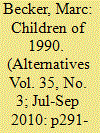

|
|
|
|
|
| Publication |
2010.
|
| Summary/Abstract |
In June 1990, the Confederation of Indigenous Nationalities of Ecuador (CONAIE) led a massive uprising against their social, economic, and political marginalization. The protest altered the political landscape of Ecuador and gave that country a reputation as home to some of the strongest and best-organized social movements in South America. Two decades later-this year, 2010-the children of the leaders of that historic uprising continued to lead mobilizations against the government. This time, however, Rafael Correa, whom many saw as emblematic of Latin America's shift to the left, was in power. What explains indigenous protest against a leftist government? Was Correa not a true leftist, as some militants alleged? Or was this yet another example of a white urban left failing to take the concerns of rural indigenous communities into account? Recent developments point to an alternative explanation: Indigenous movements have become more conservative and have discarded a strategy of building coalitions that had brought them so much success in the twentieth century.
|
|
|
|
|
|
|
|
|
|
|
|
|
|
|
|
| 4 |
ID:
184235
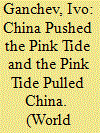

|
|
|
|
|
| Summary/Abstract |
This article examines the rise of leftist ideology in Ecuador and Bolivia in light of their deepening economic relations with China from 2005 to 2014. First, it reveals that market trends account for trade fluctuations but fail to explain Chinese investment in, and some loan deals with, Ecuador as well as loans to Bolivia. Second, it demonstrates how these forms of funding provided alternatives to U.S.-led international institutions, enabling Rafael Correa and Evo Morales to steer away from Western influence. Third, it contends that four factors led to a cyclic reinforcement of Chinese economic interests and the rise of leftist ideology in Ecuador and Bolivia, namely: mutual complementarity between China’s demand for energy/natural resource supply diversification and Pink Tide development agendas; U.S.–China geopolitical competition for influence in Latin America; China’s experience in engaging with leftist governments from developing countries; and anti-Americanism shaping national identity in Ecuador and Bolivia.
|
|
|
|
|
|
|
|
|
|
|
|
|
|
|
|
| 5 |
ID:
100419
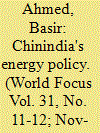

|
|
|
| 6 |
ID:
089090
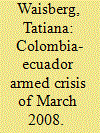

|
|
|
|
|
| Summary/Abstract |
This article analyzes the 2008 Colombia-Ecuador armed crisis in the light of the practice of targeted killings and incursions against non-state actors harbored at terrorist safe havens in a third party state. The Colombian use of force against Fuerzas Armadas Revolucionarias de Colombia (Revolutionary Armed Forces of Colombia-FARC) is discussed in the context of use of force in International Law regarding the right of self-defense against non-states actors and third state parties' obligation to deny passive support. It is argued that the Colombia situation is similar to the situation faced by Israel and Turkey.
|
|
|
|
|
|
|
|
|
|
|
|
|
|
|
|
| 7 |
ID:
132892
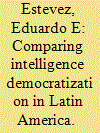

|
|
|
|
|
| Publication |
2014.
|
| Summary/Abstract |
This article aims to contribute to the understanding of the intelligence democratization process in new democracies comparing three South American countries: Ecuador, Peru, and Argentina. With a background of authoritarian legacies ('political police' style intelligence agencies controlled by the military) under particular political circumstances and changing strategic environments, these countries experienced disparate trajectories, prescriptions, and outcomes in their efforts to reform their intelligence communities. Drawing on new institutionalism, historical moments and relevant events shaping the dynamics of intelligence democratization are highlighted for each case, depicting failures and successes, and identifying drivers of change.
|
|
|
|
|
|
|
|
|
|
|
|
|
|
|
|
| 8 |
ID:
110111
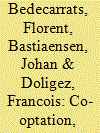

|
|
|
|
|
| Publication |
2012.
|
| Summary/Abstract |
The past decade has been marked by the resurgence of leftist political movements across Latin America. The rise of the 'new left' masks the ambivalent relationships these movements have with broader society, and their struggle to find an alternative to the prevailing development model. Filling the void left by failed public banks, the microfinance sector has grown significantly across the continent in an increasingly commercial form. Analysis of Nicaragua, Ecuador and Bolivia reveals that their new governments share a common distrust of microfinance. Yet, in the absence of viable alternatives for financial service provision, governments and microfinance stakeholders are forced to coexist. The environment in which they do so varies greatly, depending on local political and institutional factors. Some common trends can nevertheless be discerned. Paradoxically, the sector seems to be polarised into two competing approaches which reinforce the most commercially oriented institutions on the one hand, and the most subsidised on the other, gradually eliminating the economically viable microfinance institutions which have tried to strike a balance between social objectives and the market.
|
|
|
|
|
|
|
|
|
|
|
|
|
|
|
|
| 9 |
ID:
153038
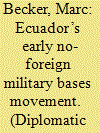

|
|
|
|
|
| Summary/Abstract |
Peace activists from around the world gathered in Ecuador in 2007 for the International Conference for the Abolition of Foreign Military Bases and demanded the closure of existing foreign bases, a cleanup of environmental contamination, and an end to legal immunity for foreign military personnel. They called for support for and solidarity with “those who struggle for the abolition of all foreign military bases worldwide.”1 The conference came immediately after Rafael Correa, riding a rising tide of anti-imperialist sentiment, assumed office. The leftist president highlighted the United States’ hypocrisy when he famously quipped that he would allow the United States to maintain its military presence in Ecuador if in exchange the United States would permit his country to establish a base in Miami. Correa refused to renew a ten-year lease on the military base at Manta. When the U.S. lease expired two years later, U.S. troops peacefully departed.
|
|
|
|
|
|
|
|
|
|
|
|
|
|
|
|
| 10 |
ID:
146021
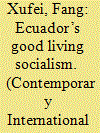

|
|
|
|
|
| Summary/Abstract |
Ecuador adopted Good Living Socialism in 2007 under the leadership of President Rafael Correa. Good Living Socialism is derived from traditional thinking of Ecuador’s indigenous peoples and is a rejection of neoliberalism. It can also be considered a product of the leftist politics of modern Latin America, especially the radical left. It is an important part of Socialism of the 21st Century. Correa’s Good Living Socialism has made remarkable achievements in the political, economic, social and foreign relations fields, but it is also facing serious challenges because of complicated external and internal circumstances. Its outlook remains uncertain.
|
|
|
|
|
|
|
|
|
|
|
|
|
|
|
|
| 11 |
ID:
157343
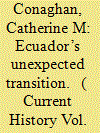

|
|
|
|
|
| Summary/Abstract |
“Rather than take marching orders from the outgoing president, Moreno distanced his government from the authoritarianism and corruption of the Correa era.”
|
|
|
|
|
|
|
|
|
|
|
|
|
|
|
|
| 12 |
ID:
150744
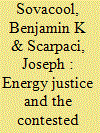

|
|
|
|
|
| Summary/Abstract |
Ecuador's progressive Yasuní-ITT Initiative, operational 2007 to 2013, would have left almost one billion barrels of crude oil locked in perpetuity beneath one of the most intact and diverse nature reserves on the planet. The project attempted to “strand” these oil assets in order to protect biodiversity, respect the territory of indigenous peoples, combat climate change, and encourage more sustainable economic development. The Yasuní-ITT proposal would have had the international community pay Ecuador $3.6 billion—roughly half the value of the oil found there—in exchange for not developing the Ishpingo Tambococha Tiputini (ITT) oilfields. Funds would have been placed into social and environmental development programs and the promotion of domestic renewable energy. Instead, the project collected only $13 million and succumbed to a series of challenges including limited financing, intense political pressure, a national commitment to oil, and carbon leakage. This article summarizes the history, benefits, and insurmountable obstacles facing the Yasuní-ITT Initiative and presents six broader lessons and implications for climate and energy analysts, practitioners, and policymakers. It questions the political viability of and serves as a stark warning against those promoting and advocating policies centered on carbon budgets, stranded assets, negative emissions, and carbon revenue streams.
|
|
|
|
|
|
|
|
|
|
|
|
|
|
|
|
| 13 |
ID:
144258
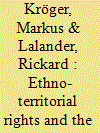

|
|
|
|
|
| Summary/Abstract |
In recent times a growing number of Latin American rural groups have achieved extended ethno-territorial rights, and large territories have been protected by progressive constitutions. These were the outcomes of extended cycles of national and transnational contentious politics and of social movement struggle, including collective South–South cooperation. However, the continent has simultaneously experienced a resource extraction boom. Frequently the extractivism takes place in protected areas and/or Indigenous territories. Consequently economic interests collide with the protection and recognition of constitutional rights. Through a review of selected demonstrative cases across Latin America, this article analyses the (de jure) rights on paper versus the (de facto) rights in practice.
|
|
|
|
|
|
|
|
|
|
|
|
|
|
|
|
| 14 |
ID:
165351
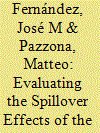

|
|
|
|
|
| Summary/Abstract |
The Colombian civil war lasted for nearly six decades with approximately 10 percent of its population being displaced over the same period. The implications of this conflict have transgressed international boundaries. Countries such as Ecuador experienced an exodus of victims as well as an increase in the presence of armed groups, along with the proliferation of illegal businesses. Even though the internal social and economic consequences of the Colombian conflict have been documented in the literature, there is yet to be a study addressing these issues from the perspective of impacted neighboring countries. In this work, we contribute to the literature by evaluating whether the influx of asylum seekers and the increasing presence of armed groups in the bordering provinces of Ecuador have lead to an increase in violence among these provinces. We do not find any link between the arrival of asylum seekers and the incidence of violent crimes in the Ecuadorean bordering provinces. Similarly, our results indicate that despite an increase in the presence of armed groups, these regions did not experience an increase in the homicide rates significantly different from the other provinces. The results are robust to various specifications and econometric techniques.
|
|
|
|
|
|
|
|
|
|
|
|
|
|
|
|
| 15 |
ID:
113894
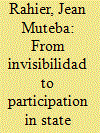

|
|
|
|
|
| Publication |
2011.
|
| Summary/Abstract |
In this article I briefly discuss the process that led in 1998 to the first Ecuadorian Constitution to adopt multiculturalism as a fundamental principle in its description of the nation and that for the first time gave special collective rights to Indigenous peoples and, in a less obvious way, to Afro-Ecuadorians. I then discuss some of the processes by which the second multicultural Constitution was adopted in 2008 in Ciudad Alfaro by a Constituent Assembly dominated by the party Alianza País, founded by the current President, Rafael Correa, a proponent of "21st century socialism." My discussions are done with the objective of commenting on the Afro-Ecuadorian activism and political organizing that took place since the late 1970s and also right before or, for the 2008 Constitution, during the actual processes of constitutional writing. I discuss Afro-Ecuadorian participation in corporatism, which mostly developed since the end of the 1990s along with the corporatist integration of other sectors of Ecuadorian society, including Indigenous groups and workers' unions. I show that Afro-Ecuadorian influences on, and participation in, the process that led to the adoption of the 2008 Constitution was in fact corporatist. I conclude that if it is true that current corporatist practices and the existence of the CODAE make it more difficult to represent and theorize Afro-Ecuadorians as the country's "ultimate Others," particularly when considering the rather successful Afro-Ecuadorian participation in the 2008 Constitutional processes, it is not less true that Ecuadorian civil society still has a long way to go to end its long history of anti-black racism.
|
|
|
|
|
|
|
|
|
|
|
|
|
|
|
|
| 16 |
ID:
129195
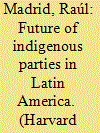

|
|
|
|
|
| Publication |
2014.
|
| Summary/Abstract |
After a long period of relative quiescence, indigenous movements in Latin America have mobilized. A wave of indigenous protests swept through the Andean countries beginning in the 1980s and made its presence felt as far north as Mexico. Indigenous groups have blocked roads, occupied buildings, and held mass rallies to let their demands be known. They have also entered the electoral arena in unprecedented numbers. Some indigenous groups and leaders have allied with non-indigenous parties, lending their support to the parties in exchange for candidacies or policy concessions. Other indigenous groups have opted to form their own political parties. In Bolivia, Colombia, Ecuador, and Guatemala, indigenous parties have launched presidential campaigns and in a host of other Latin American countries indigenous parties have competed in legislative or municipal elections.
Bolivia's Movement toward Socialism, known as the MAS for its Spanish initials, has been the most successful of the indigenous parties. The MAS has dominated Bolivian politics since 2005, winning every major election since that time. Its leader, Evo Morales, has occupied the presidency for the last eight years, and the MAS currently controls both houses of the Bolivian legislature as well as most of the country's departments.
|
|
|
|
|
|
|
|
|
|
|
|
|
|
|
|
| 17 |
ID:
113518
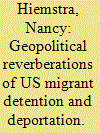

|
|
|
|
|
| Publication |
2012.
|
| Summary/Abstract |
While recent scholarship has paid critical attention to the changing relationship between territory and borders, there remains much to be said about the ways in which borders are being pushed outwards via immigration enforcement. In this paper, I argue that one must look outside the borders of the policymaking state to understand the geopolitical depth and breadth of immigration enforcement policies and practices. I examine ways in which US migrant detention and deportation reverberate in Ecuador. Research in Ecuador with detained migrants' family members and deported migrants shows that the impacts of these policies are far from contained along with the migrant's incarcerated and "removed" body; instead, they extend spatially and temporally beyond US borders, and into local, personal spaces and places in Ecuador. I demonstrate that scrutiny of the extra-border geographies of immigration enforcement policies allows us to identify the uneven, unpredictable, and sometimes violent ways in which these policies expand in practice. This research also suggests that detention and deportation do not meet US policymakers' stated objective of deterring future migration.
|
|
|
|
|
|
|
|
|
|
|
|
|
|
|
|
| 18 |
ID:
124213
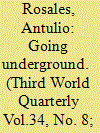

|
|
|
|
|
| Publication |
2013.
|
| Summary/Abstract |
This article argues that South America's 'revolutionary' left turn can be best explained by its assertion of state property over natural resource extraction. The recent history of the leftist movements in Venezuela, Bolivia and Ecuador relates to the failures of the neoliberal reforms applied in the region decades before, hence the dismantling of core orthodox policies has been critical for them once in power. This has been possible through the expansion of state action in the economy, but mainly through the governance of hydrocarbon extraction and the control of subsoil rents. Resource extraction has been central to the political economy of Andean left-wing revolutionaries, responsible for many of their successes but also their impending challenges. This rearticulation of underground governance is linked to global transformations that give prominence to emerging economies and reinforces these countries' position in the world economy as providers of primary commodities.
|
|
|
|
|
|
|
|
|
|
|
|
|
|
|
|
| 19 |
ID:
086785


|
|
|
|
|
| Publication |
2009.
|
| Summary/Abstract |
Ecuador will hold elections on 26 April, not just for the presidency and the legislature but also for provincial and municipal governments. Having overhauled the country's constitution in 2008, President Rafael Correa Delgado hopes to win re-election. With the opposition weak and divided, Correa is likely to achieve this aim, having managed to concentrate power in his hands in ways that no Ecuadorian president has in the past 30 years.
|
|
|
|
|
|
|
|
|
|
|
|
|
|
|
|
| 20 |
ID:
101760
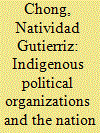

|
|
|
|
|
| Publication |
2010.
|
| Summary/Abstract |
The growing visibility of indigenous political organizations and activism in Latin America has a variety of claims and methods to interrelate with the state and organized civil society. These claims are framed within the logic of development and state construction; thus, these political projects fueled by ethnic actors do not have a secessionist outlook. This article addresses the different types of ethnic conflict current in Latin America. It also discusses the practical experience of implementing rights of autonomy. By highlighting the frequent types of ethnic conflict and their prevalence, the author looks forward to proposing a comparative model to explain the different routes taken by the construction of an inclusive, plurinational state led by ethnic actors. The article derives its analysis from the data bank of indigenous organizations, ORGINDAL.
|
|
|
|
|
|
|
|
|
|
|
|
|
|
|
|
|
|
|
|
|